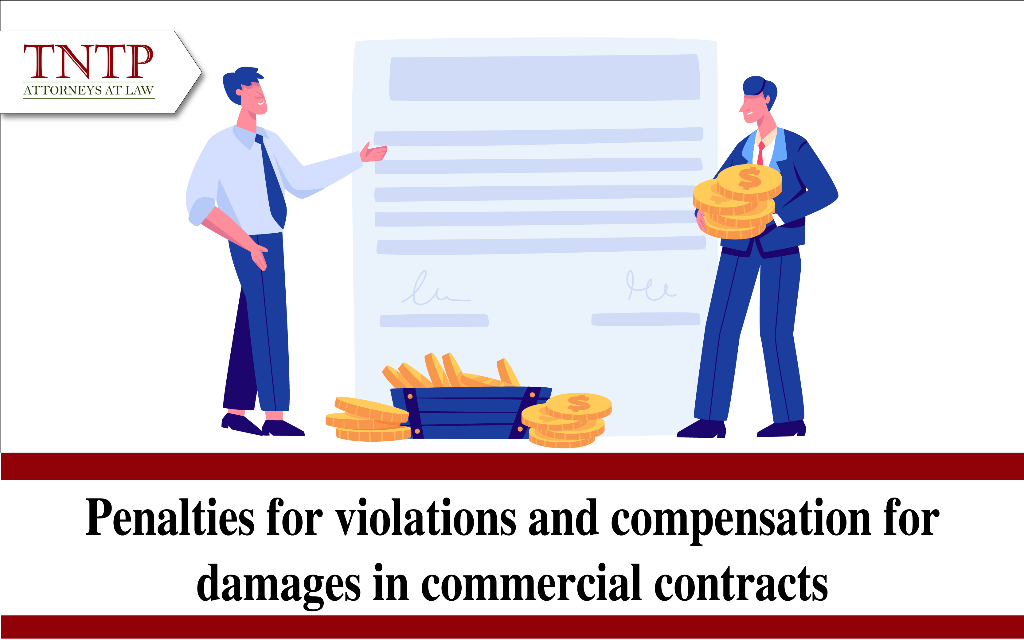In commercial contracts, the parties involved often apply sanctions to ensure the implementation of contractual obligations and ensure the legitimate rights and interests of the aggrieved party in case of a breach by the other party. In this article, TNTP’s lawyers will provide an analysis of penalty for breaches and compensation for damages in commercial contracts.
1. Penalties for breaches
According to the provisions of Article 300 of the Commercial Law 2005, Penalty for breach is a remedy whereby the aggrieved party requires the breaching party to pay a penalty sum for the breach of contract where this is so agreed in the contract, except for cases of liability exemption as prescribed by law.
Therefore, a prerequisite for this remedy to be effective is there is a penalty agreement in the contract between the parties. In that case, the breaching party will have to pay the aggrieved party a penalty as agreed upon by the parties. However, penalties for breaches will not apply in cases of exemption from liability as prescribed by law, including:
– Cases of liability exemption agreed upon by the parties occurs;
– Cases of force majeure events;
– Breaches by one party are entirely attributable to the other party’s fault;
– Breaches are committed by one party as a result of the execution of a decision by a competent state management agency which the parties could not have known at the time the contract was concluded.
According to the provisions of Article 301 of the Commercial Law 2005, the level of penalty for the breach of a contractual obligation or the total amount of penalties for multiple breaches agreed upon in the contract by the parties shall not exceed 8% of the value of the breached contractual obligations portion, except for cases of incorrect assessment results.
Thus, although the agreement on penalties for breaches is mutually agreed upon by the parties, the penalty amount is limited to only 8% of the value of the breached contractual obligations portion. This is to ensure that penalties for breaches are not exploited in cases where one party to the contract in a weaker position has to accept an excessively large due to the other party’s upper hand.
Furthermore, according to the provisions of Article 301 of the Commercial Law 2005, the penalty value shall not apply when there is evidence proving that the assessment result of the value of the breached contractual obligations portion provided by the assessment service provider is false. This is to ensure fairness and protect the rights and interests of the party responsible for paying the penalty, based on the true value of the breached contractual obligations portion.
2. Compensation for damages
• According to the provisions of Clause 1 Article 302 of the Commercial Law 2005, Compensation for damages means a remedy whereby the breaching party compensates for the loss caused by a contract-breaching act to the aggrieved party.
Unlike penalties for breaches, compensation for damages is a remedy applicable without requiring an agreement in the contract, as long as there is actual damage caused by the breaching party’s actions to the aggrieved party, the breaching party is obligated to compensate for the damages.
• According to the provisions of Clause 2 Article 302 of the Commercial Law 2005, the value of compensation for damages covers the value of the material and direct loss suffered by the aggrieved party due to the breach of the breaching party and the direct benefits which the aggrieved party would have received if such breach had not been committed.
Therefore, it can be seen that, unlike the penalties for breaches, which are limited to 8% of the value of the breached contractual obligation portion, the compensation value will be calculated as the entire value of the actual, direct losses suffered by the aggrieved party if there are sufficient grounds to prove these losses. In addition to the actual losses, compensation for damages also applies to the direct benefits that the aggrieved party would have received if there had been no breach. These benefits are the ones that would have created value in the future, but due to the breach, they result in losses for the aggrieved party by not being able to enjoy these benefits.
• Burden of Proof:
According to the provisions of Article 304 of Commercial Law 2005, the party requesting compensation for damages has the burden of proof for the losses, the extent of losses caused by the breach, and the direct benefits that the aggrieved party should have received if there had been no breach.
Therefore, in order to have a basis for claiming damages, the aggrieved party is obliged to prove the losses, the extent of the losses caused by the breach and the direct benefits that the aggrieved party should have received. This proof of loss must be expressed in writing, legally valid documents and must reflect the nature of the case, be objective, and must have a connection and a cause-and-effect relationship to the breaches. The clearer and more accurate the evidence, the better the rights of the aggrieved party can be ensured, and, at the same time, allow to determine the obligation to compensate for the damages caused by the breaching party.
From the above content, it can be seen that penalties for breaches and compensation for damages are sanctions that contribute to protecting the rights and interests of the aggrieved party due to the breach. This binds the parties to properly perform their committed obligations under the contract, contributing to protecting the legitimate rights and interests of the parties when damage occurs due to the other party’s fault.
Above is an article by TNTP’s lawyers on the topic: “Penalties for breaches and compensation for damages in commercial contracts”. We hope that the above article brings value to readers.
Best regards.







